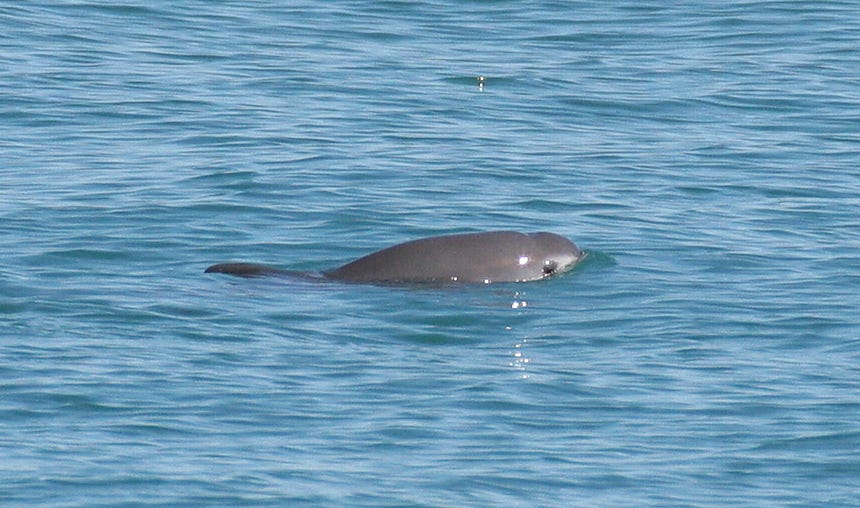Name: Vaquita (Spanish for “little cow”)
Family: Phocoenidae
Genus: Phocoena
Population: The vaquita is the most endangered marine mammal in the world with only 10-20 individuals left. These little porpoises were only discovered in 1958. With a population of around 600 in 1997, their decline has been sudden.
Status: On the IUCN Red List under ‘critically endangered’, they are currently on the brink of extinction due to frequent entanglements in illegal gillnets.
Location: The vaquita is endemic to the Gulf of California, Mexico, which is the smallest range of any marine mammal. It seems everything about these porpoises is on the smaller side. They also prefer to live in shallow (small in depth☝️) waters of less than 150 metres deep!
Weight: They can weigh anywhere between 27 and 68 kg which is teeny tiny even for a porpoise.
Length: Females often grow to be slightly bigger than the males, reaching a length of around 150 cm while the males reach up to 140 cm.
Anatomy: If their size doesn’t give them away then the vaquita can be easily distinguished by its tall, triangular dorsal fin which allows them to dissipate extra body heat in those warm Mexican waters. They’re grey in colour with a slightly darker back and they also have cute little black eye patches and lips which makes it look like they’re smiling. I’m sure they aren’t smiling but 🥺.
Diet: Vaquita usually eat fish, crustaceans and squid. Scrumdidlyumptious.
Social habits: They are either seen alone or in pairs, often with a calf. They have been spotted in groups of up to 10 but that might be the entire remainder of the species. Perhaps they’re getting together to strategise how to survive.
Reproduction: A vaquita pregnancy lasts for 10-11 months and they usually give birth to a single calf every other year. Research suggests they have polygynous mating systems whereby males will compete for the females. This can sometimes lead to inbreeding in a species with a population as small as this, but there is no evidence of this with vaquitas. This may actually make it harder to strengthen their population.
Unique facts:
They’re the only species in their family which can be found in warmer waters.
In an attempt to prevent extinction, a trial attempt to take a vaquita into captivity unfortunately resulted in its demise. No further attempts have been made.
These little guys are the smallest cetaceans in the world. They’re shy and gentle and just want to peacefully live out their days in their little corner of the world.
Threat of entanglement: The sole reason vaquitas are endangered is because they are so often caught and drown in gillnets. Commercial and illegal gillnets in Mexico’s Gulf of California are used by fisheries to catch another vulnerable species, the totoaba fish. The swim bladder of a totoaba fish is used in Chinese medicine due to a belief in an unproven ability to cure various illnesses. Though international trade of totoaba is banned under CITES, high demand from China keeps the illegal fisheries in business. Despite awareness of the illegal trade, a partial ban on gillnets in 2015 and a permanent gillnet exclusion zone created in 2017, the Mexican government has since eliminated any ‘no tolerance’ zones. In 2021 they reopened these areas to fishing and thus have put the vaquita in even more danger. Any population that drastically declines becomes more vulnerable to other threats too.
Other threats:Living in close proximity to the coast means vaquitas are threatened by entanglements, bycatch, runoff pollution, and habitat alterations. However, a simulation test run in 2022 revealed that the species could still survive if bycatch stopped immediately, despite the presence of these other environmental threats.
What can be done to protect them: Only the removal of gillnets from the Gulf of California and an immediate crack down on illegal fishing in the area will save the vaquita. In 2015, the Mexican government implemented a two-year ban on gillnet fishing but without any permanence or action against illegal fishing alongside this, these efforts were futile. Mexico must assemble a plan which enforces a total ban on the use of gillnets and restricts illegal fisheries and poachers from benefiting from totoaba trading. In July 2022 the Mexican navy took matters into their own hands and dropped 193 concrete blocks into the gulf hoping to snag and destroy any illegally placed gillnets. This isn’t the most practical or environmental solution but the same resolve must be adopted by the Mexican government to protect an area of just 110 square miles. One bold act may be impactful enough to save the entire vaquita species.
It’s difficult to comprehend that these sweet creatures could soon be no more.
Please sign this petition to show your support:
https://www.change.org/p/save-mexico-s-vaquita-porpoise-from-imminent-extinction?signed=true

Here at Beached we are building a community that can put our brains and resources together to highlight and fund solutions to the problems facing the vaquita and the oceans they live in. I hope you’ll join our humble community and click subscribe for free or support our work by purchasing the paid subscription.
All Beached posts are free to read but if you can we ask you to support our work through a paid subscription. These directly support the work of Beached and allow us to engage in more conversations with experts in the field of marine conservation and spend more time researching a wider breadth of topics for the newsletters. Paid subscriptions allow us to dedicate more time and effort to creating a community and provide the space for stakeholders to come together, stay abreast of each other’s work and foster improved collaboration and coordination.
One day Beached hope to donate a large percentage of the revenue from paid subscriptions to marine conservation organisations and charities to support their work too. Working together, we can reverse the degradation of our oceans.
Amie 🐋






Vaquita 🥹. The heart melts